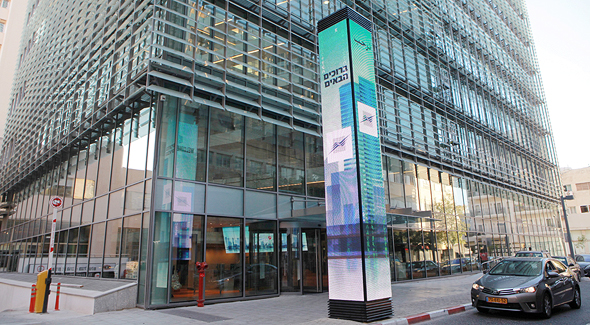Upcoming TASE IPO Could Net its International Shareholders a 40% Premium
In 2018, TASE sold most of its securities to five international funds. Now 31.7% is being offered to institutional investors and the public
11:2315.07.19
The Tel Aviv Stock Exchange is looking to perform its public offering of a 31.7% stake according to a valuation of NIS 700 million ($197 million), based on a Sunday filing. An attached valuation performed by PwC Israel valued TASE at NIS 551 million ($155 million) at the end of 2017. TASE's equity at the end of the first quarter of 2019 stood at NIS 563 million ($158.5 million), so the suggested valuation presents a 24% premium. A more updated valuation can be found inside the prospectus, where TASE CEO Ittai Ben-Zeev's options are valued at NIS 6.36 ($1.79) per share, giving the exchange a NIS 636 million ($179 million) valuation. Jefferies is the underwriter.
For daily updates, subscribe to our newsletter by clicking here.
In 2018, Ben-Zeev led the sale of most of the exchange to five international funds for NIS 5 ($1.41 in today’s conversion rates) per share. Hedge fund Manikay Partners LLC, which led the group, now owns a 19.9% stake. The remaining four—Australian superannuation fund Sunsuper, Santa Monica-based Dalton Investments LLC, New York-headquartered investment bank Moelis & Company, and Denmark-based Novo Nordisk Foundation—bought 12.93% each, but remained with direct ownership of 4.69% as the rest was put into the hands of a trustee. Following the offering, each of the four will receive another 1.2%, leaving them with a 4.99% stake in the exchange.

Tel Aviv Stock Exchange. Photo: Orel Cohenצילום: אוראל כהן
For the four funds, the minimum end of the offering's price range—NIS 5.51 ($1.55) per share—will still offer a 10% premium, but the exchange is angling for NIS 7 ($1.97) per share, a 40% premium. If the final price is above NIS 5.51, the shareholders and the exchange will evenly split the additional profit. TASE can sell up to 30% to the public, granted that shares are offered to private investors at the same price as to institutional investors.
The exchange is looking to increase its liquidity and traceability, change its company composition to better reflect the Israeli market, boost its activities with complementary services, and improve its infrastructure and operational efficiency. The exchange has also hinted at the possibility of changing or extending its trading hours to better fit the U.S. market.
The exchange's trading turnover has been falling for a while. To combat it, TASE is looking to cut bureaucratic red tape, up awareness among the public, attract new players via collaborations, and develop a database that will encourage competition. The Israeli public is not very invested in stock compared to other developed countries: in 2017 the public investment rate in Israel stood at 14%, compared to 18.8% in Australia, 22.8% in France, 23.2% in Norway, 25% in the U.K., and 35.4% in the U.S.
Among its risk factors, TASE named labor union contracts that could threaten operations, failure of its plans to increase trade turnover, and increased competition from international players. Another risk factor is a plan for the foundation of a second Israeli bourse specifically for tech companies, currently being pushed forward by the Israeli Ministries of Finance and Justice.
Related articles
When the banks were forced to cede control of the exchange after a 2017 legal amendment barred TASE members from owning a stake larger than 5%, they cautioned that the exchange's reincarnation as a for-profit company will result in upped fees for members, and consequently for the general public. The exchange collects commissions from members for trade-related matters, and also from listing companies. The exchange also collects fees from information distributors such as Bloomberg.
While the exchange did not specifically refer to the possibility of upping its commissions in its prospectus, it has stated that it will "continue to consider its price list according to circumstances and market needs."



